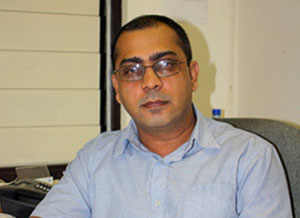
SUVA (Pacific Media Watch / Pacific Scoop): Pacific news media need to adopt a constructive and proactive approach to reporting conflicts, says Fiji media educator Shailendra Singh.
Speaking to University of the South Pacific (USP) student journalists in Suva, Singh said a rethink about how media covered conflicts was overdue.
He said this was especially important for Fiji, where “instability has caused a huge and lasting setback on development”.
The South Pacific had become a volatile region, and violent conflict was regarded as the biggest threat to sustainable development in some island countries, he said.
Singh is a former head of USP journalism and is currently pursuing doctoral studies in Brisbane. His research focuses on conflict reporting in Fiji and the Pacific.
Journalism frameworks
As part of his research, Singh is investigating allegations that traditional journalism frameworks fuel conflicts by focusing on the manifestations of conflict, such as violence, while avoiding complex explanations. He is using Fiji as the setting, with media coverage of the country’s 2006 elections as a case study.
Singh has carried out a national journalist survey, a content analysis of Fiji’s 2006 elections, and in-depth interviews with various media stakeholders. He said that his findings would form the basis of his recommendations about conflict reporting.
“I am looking at a possible responsible conflict reporting framework,” he said. “In a nutshell, this is journalism sensitised to its role in, and impact on, conflict. This is important for Fiji, where instability has caused a huge and lasting setback on development.”
Media standards
On media standards, Singh said there was always room for improvement, but if critiques were to be useful, they needed to consider the context.
He said problems with English, which was not the first language in Fiji and the Pacific, were well documented. Still, the standard of English in Fiji was quite high until the 1987 coup, which caused a huge flight of skills, including English teachers and journalists.
“We have never filled the gap because of successive coups,” said Singh.
A high turnover of journalists had also affected standards because the “ability to write analytically develops with time and experience. In Fiji, many journalists leave the industry before their time.”
Improving English language skills and addressing other structural factors had to be considered if real improvements were to be made, Singh said.
Some older journalists were still in the industry but they were running newsrooms rather than writing or reporting, he said.
Production deadlines, market conditions, competition and the need to keep costs low were also impacting on standards in Fiji, as they were in other countries. Singh said it would be “imprudent” to suggest individual journalists or media companies were to be blamed when any decline was clearly linked to several structural and environmental factors.
He said improving English language skills along with addressing other structural factors had to be considered if real improvements were to be made.
Journalism education
Turning to USP journalism, Singh said that despite resource constraints, the programme had achieved several international benchmarks, such as winning Ossie Awards for student journalism in Australia on a consistent basis.
Also, top USP journalism graduates had been able to secure scholarships with universities in Australia, New Zealand, Japan, Europe and the US. USP journalism graduates were highly employable in Fiji and the region, including Australia and New Zealand.
Apart from the news media, USP journalism graduates were well represented in international organisations such as the Red Cross, World Wildlife Fund (WWF), Greenpeace, and United Nations agencies.
USP graduates singled out by Singh included:
• Christine Gounder, Radio New Zealand journalist
• Rashneel Kumar who represented Oceania in the International Olympic Committee (IOC) Young Reporters Programme in Singapore in 2010, and was invited to speak at the 5th Women in Sports conference in Los Angeles in 2012
• Katrina Ma’u from Tonga, a Masters graduate from the University of Glasgow, now working at the Pacific Islands Forum Secretariat
• Tara Chetty, a US Fulbright scholar
• Reggie Dutt, Masters graduate from Bond University, working for the International Red Cross
• USP journalism’s first Masters graduate, Shazia Usman, who won an award to present at the 2012 Journalism Education Association of Australia conference
Singh said all the student achievers mentioned were hard working, committed and ambitious.
“Without hard work, no one gets very far, regardless of the programme or the lecturers,” he told the students. “So do not stake your entire future on the programme or the lecturers. A lot depends on your attitude also.”
He said that as USP journalism students, it was important they had confidence in the programme, which had a proud record.
Local talent
Singh added that local talent was sometimes underestimated because Fiji was a small country. He said Fijians had done well internationally.
Some are teaching at top Australian and New Zealand universities at professorial level.
Local doctors, nurses, teachers and other trades and professions are also highly sought after overseas. In journalism, former Fiji Sun staff Arvin Kumar is the chief subeditor at Rural Press. Another former Fiji Sun staff member, Harris Choy, is a well-known rugby writer for a news agency in New Zealand.
Two former staff members at the Fiji Times, Arthur McCutchan and Sophie Foster, are employed at the Brisbane Courier-Mail, published by News Limited.
Singh said it was important for USP journalism students to have faith in local talents, and to have local role models.
USP's Wansolwara journalism website
This article was written by Sherita Sharma who is a graduate journalist from the University of the South Pacific. This week she won the graduating Gold Medal for journalism at USP.
This work is licensed under a Creative Commons Attribution-NonCommercial 3.0 New Zealand Licence.




